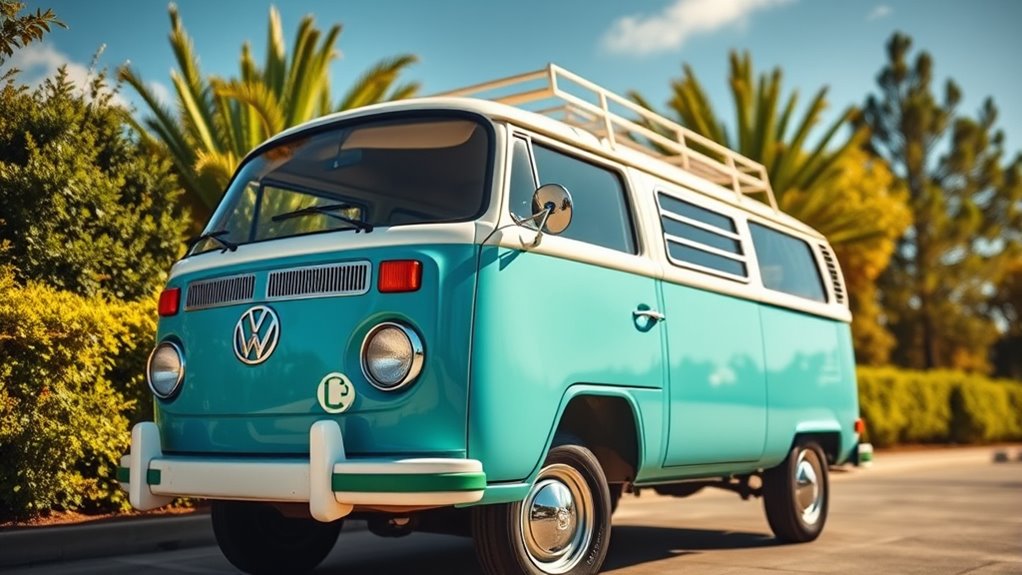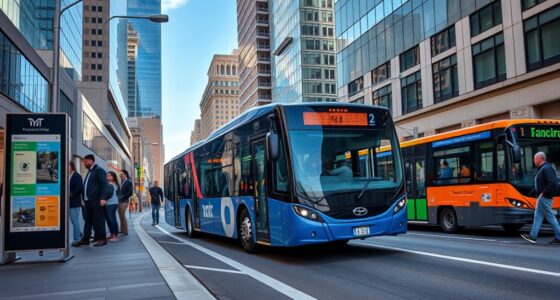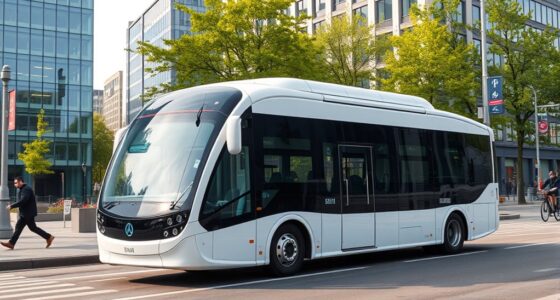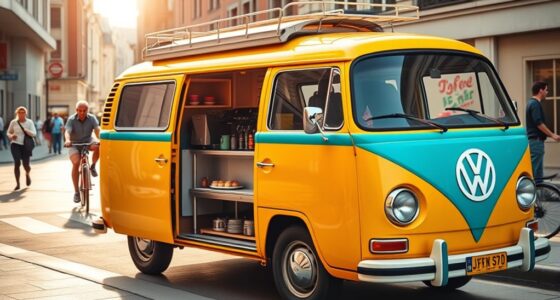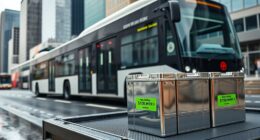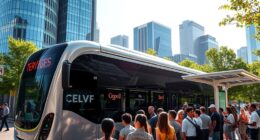A classic VW bus has been successfully transformed into an electric vehicle, highlighting the benefits of modern battery technology and charging infrastructure. Upgrading to lithium-ion packs improves range, performance, and reliability, while fast chargers and home stations make daily use practical. The result is a vintage style with modern efficiency and easier maintenance. If you continue exploring, you’ll discover how this project blends nostalgia with innovation and what makes it a true success story.
Key Takeaways
- The VW Bus was successfully converted to electric, utilizing modern lithium-ion batteries for improved range and performance.
- Upgraded charging infrastructure enabled convenient daily use and quick top-ups, reducing range anxiety.
- The electric motor provided silent operation and better weight distribution, enhancing driving comfort and handling.
- The conversion preserved the vintage aesthetic while integrating advanced tech for reliability and reduced maintenance.
- The project demonstrated how EV conversions can modernize classic vehicles for practical, eco-friendly daily driving.

Have you ever wondered how converting a traditional vehicle to electric can transform your driving experience? When you decide to bring your classic VW bus into the modern age, the first thing you’ll notice is how much smarter and more efficient your journey becomes, thanks to advances in battery technology and charging infrastructure. The core of this transformation lies in the evolution of battery tech, which now offers higher energy density, faster charging times, and longer-lasting performance. Instead of the old lead-acid batteries that struggled to hold a charge, you’ll find lithium-ion packs that pack a punch, allowing your vintage VW to deliver impressive range and reliability. This means you can enjoy your favorite road trips without constantly worrying about finding a charging station or carrying extra batteries. The improvements in battery technology also translate to a more balanced weight distribution, which helps preserve the original feel of your classic vehicle while enhancing its driving dynamics.
As you convert your VW bus, you’ll also discover how the expanding charging infrastructure makes electric conversions more practical than ever before. Today’s charging stations are more widespread and versatile, from fast chargers located along highways to home charging units that simplify overnight top-ups. With a properly installed home charger, you can start each day with a full battery, making electric driving as convenient as traditional refueling. The availability of charging points means you’re less likely to be stranded, and the process of plugging in your vehicle is straightforward. Plus, many public chargers now support fast charging, which can replenish your battery in under 30 minutes—perfect for quick stops during long trips. This reliable and accessible charging infrastructure essentially removes the biggest hurdle for vintage EV conversions, turning your classic VW bus into a practical, daily driver. Furthermore, the increased variety of anime movies now available offers diverse entertainment options to keep you company on long trips, making the journey even more enjoyable.
The combination of advanced battery technology and a robust charging network also offers peace of mind. You know that your vehicle isn’t just environmentally friendly but also cost-effective to operate. Maintenance becomes simpler, with fewer moving parts and less wear and tear on components like the engine or transmission. The silent operation of electric motors adds to the overall enjoyment, giving your vintage vehicle a fresh, modern feel without sacrificing its nostalgic charm. In the end, transforming your VW bus into an electric vehicle isn’t just about embracing new tech; it’s about reimagining the driving experience, where reliability, convenience, and sustainability come together seamlessly. Thanks to cutting-edge battery tech and an expanding charging infrastructure, you’re stepping into a future where vintage style meets contemporary innovation.
Frequently Asked Questions
What Is the Estimated Cost of Converting a VW Bus to Electric?
When you ask about converting a VW bus to electric, you’ll find that conversion costs vary based on component pricing and project scope. On average, you should budget between $8,000 and $20,000, depending on the quality of parts and labor. Higher-end components and additional modifications increase expenses, but a well-planned conversion can be cost-effective. You’ll want to research different component options to balance performance and budget.
How Long Does the Conversion Process Typically Take?
The conversion timeline varies, but you can generally expect it to take between 4 to 8 weeks. You’ll need to coordinate with your workshop for scheduling, as they often plan multiple projects simultaneously. Factors like the complexity of the conversion and availability of parts can influence the timeframe. Staying in close contact with your conversion team helps guarantee smooth progress and timely completion of your electric VW bus.
What Maintenance Is Required for the Electric VW Bus?
You’ll want to regularly inspect the battery and keep an eye on its health, ensuring it stays efficient. Additionally, check the brake system often, as electric vehicles rely heavily on regenerative braking. Routine maintenance like tire rotations and fluid level checks are also essential. With proper care, your electric VW bus stays reliable and performs ideally, giving you a smooth, eco-friendly ride every time you hit the road.
How Does the EV Conversion Affect the Vehicle’S Original Value?
You might wonder how converting your VW bus to electric impacts its restoration value and collector appeal. Generally, an EV conversion can decrease the vehicle’s original authenticity, potentially lowering its restoration value for purists. However, if done professionally, it can boost collector appeal by showcasing innovation and sustainability. Overall, it’s a balancing act—consider whether the modern upgrades align with your goals for preservation or future value appreciation.
Are There Any Legal or Registration Hurdles Post-Conversion?
Did you know that over 60% of EV owners face registration challenges post-conversion? You might encounter legal compliance issues or need special inspections to update your vehicle’s registration. To avoid hurdles, research local laws and guarantee your conversion meets all standards. Staying informed helps you smoothly navigate registration and legal requirements, making your electric conversion hassle-free and fully compliant with regulations.
Conclusion
Your classic VW Bus now runs like a glowing ember reignited, proving that with passion and effort, old dreams can ignite new journeys. This transformation isn’t just about switching to electric; it’s about reviving a beloved piece of history, giving it a new heartbeat. Just as a phoenix rises from ashes, your bus now soars into the future with eco-friendly power and nostalgia intertwined. Your story shows that with determination, even the most vintage dreams can shine bright again.
